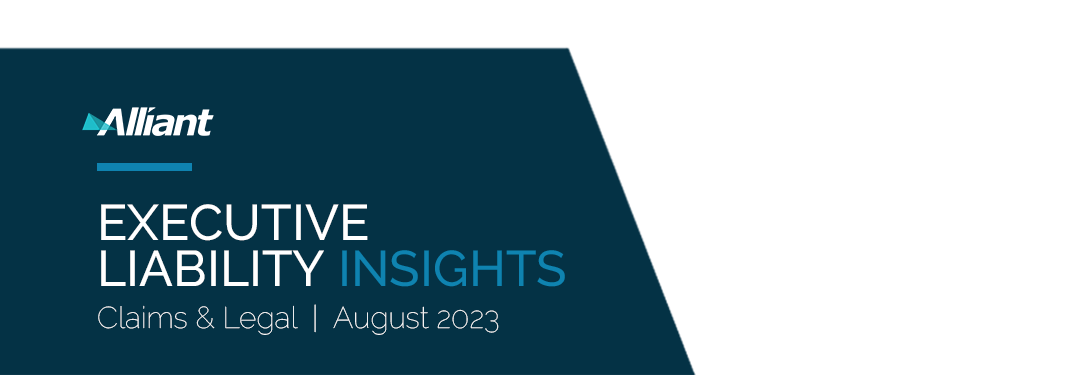
Navigating today’s complex risk environment can be a monumental task. Steve Shappell, Alliant Claims & Legal, spearheads Executive Liability Insights, a monthly review of news, legal developments and information on executive liability, cyber risk, employment practices liability, class action trends and more.


FEATURED ARTICLE
CGL POLICY DOES NOT PROVIDE COVERAGE FOR DERIVATIVE
Discover Prop. & Cas. Ins. Co. et al v. Blue Bell Creameries USA, Inc. et al, 22-cv-50842 (5th Cir. Jul. 11, 2023).
This is an update on an October 2022 report regarding a listeria outbreak at an ice cream manufacturer and a product recall that spawned a shareholder derivative lawsuit against the manufacturer’s directors and officers.
In This Issue:
CGL POLICY DOES NOT PROVIDE COVERAGE FOR DERIVATIVE
Discover Prop. & Cas. Ins. Co. et al v. Blue Bell Creameries USA, Inc. et al, 22-cv-50842 (5th Cir. Jul. 11, 2023).
This is an update on an October 2022 report regarding a listeria outbreak at an ice cream manufacturer and a product recall that spawned a shareholder derivative lawsuit against the manufacturer’s directors and officers.
Read More >>
NEW SEC CYBERSECURITY DISCLOSURE GUIDELINES - ARE THEY PROBLEMATIC FOR D&O POLICIES?
The SEC recently adopted new guidelines requiring publicly traded companies (as well as foreign private companies) to disclose cybersecurity incidents that could have a “material” impact on the company. The disclosures will require companies to provide a description of the material aspects of the incident, such as its nature, scope, and timing, within four business days of determining the incident as “material.”
Read More >>
CYBER CORNER
Click to read the following cases:
- LOSS BEYOND THE RESTORATION OF OPERATIONS: SEC STEPS UP ENFORCEMENT IN RESPONSE TO CYBER ATTACKS
- LEADING BRITISH THINK TANK ADDRESSES THE ROLE OF CYBER INSURANCE IN RANSOMWARE PLAGUE
Read More >>
EMPLOYMENT CORNER
Click to read the following cases:
- GEORGIA APPELLATE COURT CONFIRMS EEOC CHARGES AND RESULTING LAWSUIT ARE CLAIMS “MADE OR BROUGHT” BEFORE APPLICABLE POLICY PERIOD
- CALIFORNIA COURTS EXPAND THE REACH OF THE LABOR CODE, LEAVING EMPLOYERS WITH MORE POTENTIAL LIABILITY
Read More >>
SECURITIES CORNER
Click to read the following cases:
- FUND ADMINISTRATORS HELD RESPONSIBLE FOR DETECTING CLEAR RED FLAGS
- SEC PROPOSES NEW RULES FOR MONEY-MARKET FUNDS
- THE DISPUTE ABOUT WHETHER CRYPTOCURRENCY CONSTITUTES SECURITIES WILL GO ON
- JULY 2023 NOTEWORTHY ENFORCEMENT ACTIONS FILED
- JULY 2023 NOTEWORTHY SETTLEMENTS AND JUDGEMENTS
Read More >>
SHAREHOLDER CORNER
Click to read the following cases:
- JULY 2023 SECURITIES CLASS ACTION FILINGS
Read More >>
CGL POLICY DOES NOT PROVIDE COVERAGE FOR DERIVATIVE
Discover Prop. & Cas. Ins. Co. et al v. Blue Bell Creameries USA, Inc. et al, 22-cv-50842 (5th Cir. Jul. 11, 2023).


This is an update on an October 2022 report regarding a listeria outbreak at an ice cream manufacturer and a product recall that spawned a shareholder derivative lawsuit against the manufacturer’s directors and officers. The manufacturer lacked Directors and Officers Liability (“D&O”) insurance and was forced to rely on its commercial general liability (“CGL”) policy for insurance coverage. The court found there was no coverage under the CGL policy. The manufacturer appealed.
The appellate court affirmed the decision, finding in favor of the insurer. The court determined the directors and officers were insureds under the policy because they were executing their duties during the decision-making process regarding the alleged reports of listeria contamination. Nevertheless, the court ultimately reasoned the policy was not triggered because its duty to defend only applied to accidents, while the allegations for breach of fiduciary duty in the case at issue all stemmed from intentional acts.
The Takeaway
This case reinforces that CGL policies cannot act as a stand-in for adequate D&O coverage. Privately and publicly held corporations must secure sufficient D&O coverage, otherwise, gaps in coverage can and will occur.
NEW SEC CYBERSECURITY DISCLOSURE GUIDELINES—ARE THEY PROBLEMATIC FOR D&O POLICIES?
The SEC recently adopted new guidelines requiring publicly-traded companies (as well as foreign private companies) to disclose cybersecurity incidents that could have a “material” impact on the company. The disclosures will require companies to provide a description of the material aspects of the incident, such as its nature, scope, and timing, within four business days of determining the incident as “material.”


Additionally, companies will have to describe their processes, if any, for assessing, identifying, and managing material risks from threats. Disclosures may be delayed if the United States Attorney General determines that immediate disclosure would pose a substantial risk to national security or public safety, but the SEC must still be notified of the incident in writing.
The SEC says that these guidelines are designed to improve transparency about cybersecurity risks by creating a more adaptable, principle-based approach to articulate risk management while providing companies the freedom to implement diverse strategies for the ever-changing nature of adversarial cyber threats. The SEC seeks to ensure that companies are better equipped to handle cybersecurity challenges effectively by providing public companies with adaptive programs that can swiftly pivot in response to emerging risks. The SEC plans to accomplish this by requiring disclosures on an annual basis, highlighting the company’s cybersecurity risk management, strategy, and governance.
The impact of the new disclosure rules may also be felt under D&O policies. The new guidelines adopted by the SEC rules could increase D&O claims, as directors and officers may be held liable for failing to disclose material cybersecurity incidents in a timely manner. Given the increasing complexity of cyber risks, this impact could, in turn, make it more difficult for insurers to assess and price D&O coverage. The resulting impact could be higher premiums, or even the withdrawal of coverage altogether.
The Takeaway
The SEC is expected to issue further guidance on these rules in the coming months, which should provide the much-needed clarity on determining “material” and the level of cyber risk management reporting. However, the new guidelines demonstrate greater board-level awareness of the significant disruption of security breaches to business operations.
Cyber Corner
LOSS BEYOND THE RESTORATION OF OPERATIONS: SEC STEPS UP ENFORCEMENT IN RESPONSE TO CYBERATTACKS
Although the SEC has been developing regulations concerning cybersecurity in the financial services sector, it does not seem to be waiting for such regulations to be issued to launch enforcement actions against companies that are victims of cyberattacks.
LEADING BRITISH THINK TANK ADDRESSES THE ROLE OF CYBER INSURANCE IN RANSOMWARE PLAGUE
A prominent foundation in the UK has issued a report challenging the persistent but false narrative that cyber insurance is fueling the ransomware epidemic. Critics of this fast-growing risk transfer product have maintained that the availability of insurance incentivizes businesses to just pay their extortionists instead of finding ways to resume operations without payment.
Employment Corner
GEORGIA APPELLATE COURT CONFIRMS EEOC CHARGES AND RESULTING LAWSUIT ARE CLAIMS “MADE OR BROUGHT” BEFORE APPLICABLE POLICY PERIOD
PMTD Rests., LLC v. Houston Cas. Co., 2023 WL 4488189 (11th Cir. July 12, 2023)
Applying Georgia law, the U.S. Court of Appeals for the Eleventh Circuit affirmed the lower court’s ruling that an employee’s filing of a charge with the EEOC constitutes an “administrative proceeding” and, thus, a “claim” under the policy’s definition.
CALIFORNIA COURTS EXPAND THE REACH OF THE LABOR CODE, LEAVING EMPLOYERS WITH MORE POTENTIAL LIABILITY
People ex rel. Gracia-Brower v. Kolla’s Inc., 14 Cal. 5th 719 (Cal, May 22, 2023).
In a unanimous decision, the California Supreme Court held that “a protected disclosure under Section 1102.5(b) encompasses reports or complaints of a violation made to an employer . . . even if the recipient already knows of the violation.” The decision expands the definition of “disclosure” to provide more protection to whistleblowers from retaliation.
Securities Corner
FUND ADMINISTRATORS HELD RESPONSIBLE FOR DETECTING CLEAR RED FLAGS
The SEC recently settled charges against a Fund Service Administrator (the “Administrator”) for failing to address warning signs of fraud against a private fund and its investors. The Administrator had been providing services to a fund managed by two individuals who had previously faced fraud charges from the SEC for mishandling funds.
SEC PROPOSES NEW RULES FOR MONEY-MARKET FUNDS
The SEC has approved new rules aimed at assisting and stabilizing the money-market funds industry during periods of market stress. While previous rules were passed in 2010 and 2014, events in the recent past revealed additional vulnerabilities. During the financial crisis of 2008 and again during the 2020 coronavirus pandemic, money-market funds experienced stress requiring government intervention.
THE DISPUTE ABOUT WHETHER CRYPTOCURRENCY CONSTITUTES SECURITIES WILL GO ON
Although a federal judge in a recent split-ruling curbed the SEC’s efforts to regulate cryptocurrency and, the SEC may view this ruling as a setback, the agency maintains its enthusiasm to appeal it.
|
Director/Officer |
Role |
Company |
|
Vidul Prakash |
CFO |
View Inc. |
|
Robert Myre and Dale Dahmen |
Co-Founders |
Spartan Trading Company, LLC |
|
Emerson Sousa Pires and Flavio Mendes Goncalves |
Co-Founders |
Empires Consulting Corp. (EmpiresX) |
|
Olivier Amar |
Officer |
Frank |
|
Alex Mashinsky |
Former CEO |
Celsius Network Limited (Celsius) |
|
Director/Officer |
Role |
Company |
|
Vidul Prakash |
CFO |
View Inc. |
|
Robert Myre and Dale Dahmen |
Co-Founders |
Spartan Trading Company, LLC |
|
Emerson Sousa Pires and Flavio Mendes Goncalves |
Co-Founders |
Empires Consulting Corp. (EmpiresX) |
|
Olivier Amar |
Officer |
Frank |
|
Alex Mashinsky |
Former CEO |
Celsius Network Limited (Celsius) |
JULY 2023 NOTEWORTHY SETTLEMENTS AND JUDGMENTS
|
Amount |
Director/Officer |
Role |
Company |
|
$3,013,295.01 |
Andrew DeFrancesco |
Former Chairman |
Cool Holding, Inc. |
|
$5,332,572 |
Cooper J. Morgenthau |
Former CFO |
African Gold Acquisition Corp. |
|
$21,439,568.60 |
Johnny Tseng & Kevin Zhang |
Principals |
Summitcrest Capital, Inc. |
|
Amount |
Director/Officer |
Role |
Company |
|
$ 3,013,295.01 |
Andrew DeFrancescp |
Former Chairman |
Cool Holdings, Inc. |
|
$5,332,572 |
Cooper J. Morgenthau |
Former CFO |
African Gold Acquisition Corp. |
|
$21,439,568.60 |
Johnny Tseng and Kevin Zhang |
Principals |
Summitcrest Capital, Inc. |
Source: U.S. Securities and Exchange Commission
https://www.sec.gov/litigation/admin.htm
Source: Stanford Law School Securities Class Action Clearinghouse
ABOUT ALLIANT INSURANCE SERVICES
Alliant Insurance Services is the nation’s leading specialty broker. In the face of increasing complexity, our approach is simple: hire the best people and invest extensively in the industries and clients we serve. We operate through national platforms to all specialties. We draw upon our resources from across the country, regardless of where the resource is located.
Contributors


Abbe Darr, Esq.
Claims Attorney
abbe.darr@alliant.com
David Finz, Esq.
Claims Attorney
david.finz@alliant.com
Isabel Arustamyan
Claims Advocate
isabel.arustamyan@alliant.com
Jacqueline Vinar, Esq.
Claims Attorney
jacqueline.vinar@alliant.com
Jaimi Berliner, Esq.
Claims Attorney
jaimi.berliner@alliant.com
Malia Shappell, Esq.
Claims Attorney
malia.shappell@alliant.com
Michael Radak, Esq.
Claims Attorney
michael.radak@alliant.com
Peter Kelly, Esq.
Claims Attorney
peter.kelly@alliant.com
Robert Aratingi
Senior Claims Advocate
robert.aratingi@alliant.com
Steve Levine, Esq.
Claims Attorney
slevine@alliant.com